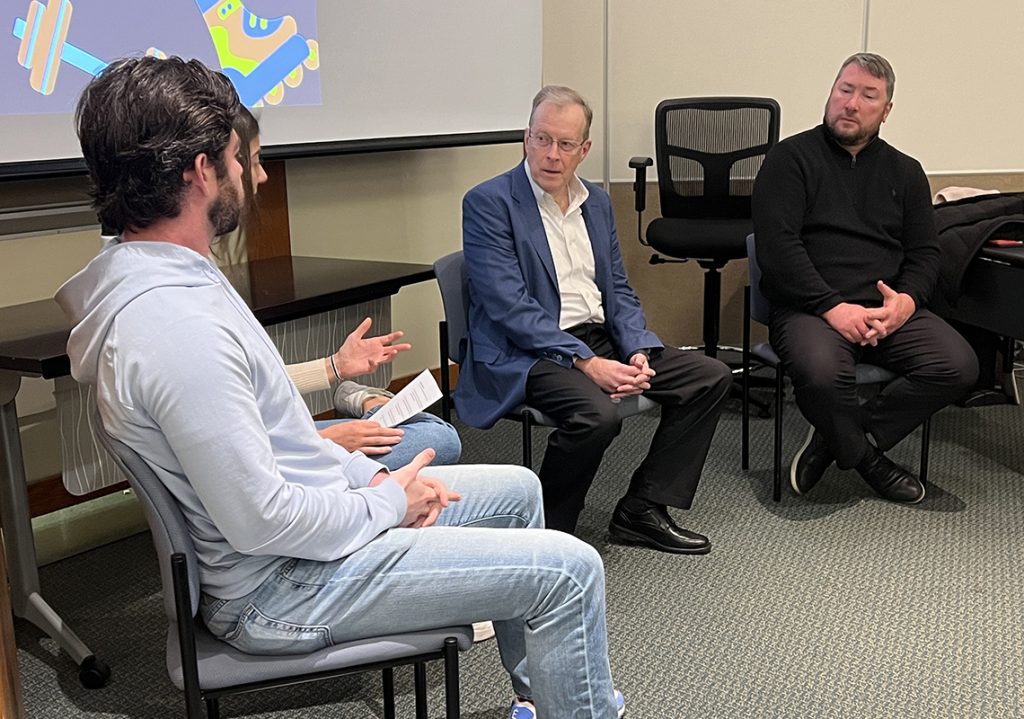In the professional sports industry, there is more to an athlete’s success beyond the outcome of a game. There is often a legal team behind the scenes making the power plays that help their clients navigate contract negotiations, brand deals, and career advancement.
To discuss the legal side of the sports business, BC Law’s Sports and Entertainment Law Society hosted a discussion on February 15 with two alumni: Jerry Buckley ’99, founder of Buckley Sports Management and former president and commissioner of the Eastern Hockey Federation; and Michael Wall ’88, member of Foley & Lardner’s sports and entertainment practice group and former general counsel of the Boston Bruins and TD Garden.
Buckley, who had played hockey his entire life, entered BC Law with the intent of focusing on business law and mergers and acquisitions. During an internship at a business management company, his manager, who played hockey at Boston University, wanted someone from the Boston College side to become involved in their cases. After having the opportunity to secure NHL contracts for two players, Buckley decided to stay in the sport law business. He represented the 1980 US Olympic hockey team, worked on the rights to the hockey movie Miracle, and handled the signings of NHL players, including Tom Fitzgerald and Mike Sullivan.
Wall, who works in sports and entertainment law, worked for six-and-a-half years in private practice before spending thirteen years with the Boston Bruins at TD Garden. He then took on the role of general counsel for the ice hockey equipment company, Bauer. Through mergers and acquisitions, he helped Bauer grow to include baseball and lacrosse, making it the top equipment company in all three areas at one point. His work also involved managing deals with players to exclusively wear the company’s equipment. In his current position at Foley & Lardner, he is now on the other side of these negotiations, representing the companies signing those types of deals.
From his different roles, Wall has the vantage point of being in-house counsel and outside counsel. “The role of a general counsel in many cases is to be a traffic cop,” Wall said. “You can’t control what legal work is coming at you, buy you can control how you address it.” He explained that it involves dealing with the issues that the business presents and providing expedited legal services. On the other hand, outside counsel requires juggling multiple clients and working on transactions, but not seeing how the business absorbs it and what it achieves.
In Buckley’s role, he works closely with individual players. He explained that there is both a business and emotional side to his job. Players need to put in the work to invest in themselves, but the stakes can become personal when putting a dollar amount on their value. When asked how his background has informed his practice, Buckley shared how he is one of the few agents in the industry who is also an attorney. Crediting his time as BC Law, he said, “The best thing I learned in law school is that you don’t fully understand your argument until you understand the other side’s fully. When you do that, you find ways to bridge a gap.”
As for their advice to aspiring sports law attorneys, Wall stressed that the industry is highly competitive and encouraged students to, “be flexible, do your homework, and look for those less than stellar opportunities to get your foot in the door.” He even suggested taking non-legal jobs within sports organizations to make connections in the legal department. In agreement, Buckley told students, “Any opportunity you get, take advantage of it to build your resume…even if it’s just part-time helping a minor league organization.” He said that while it may be a lot of work, it is great experience that organizations seek. “Just be helpful to the people you work with,” he advised. “You have to be willing to work.”


